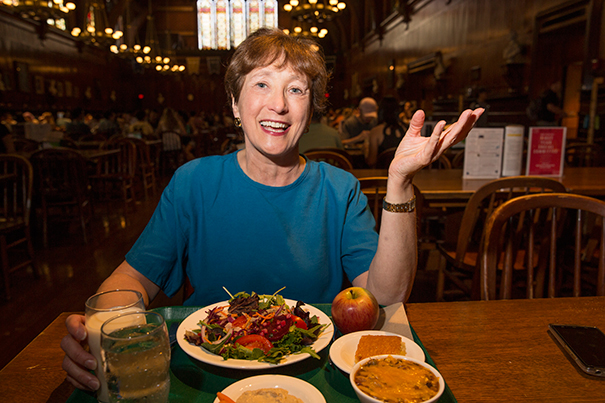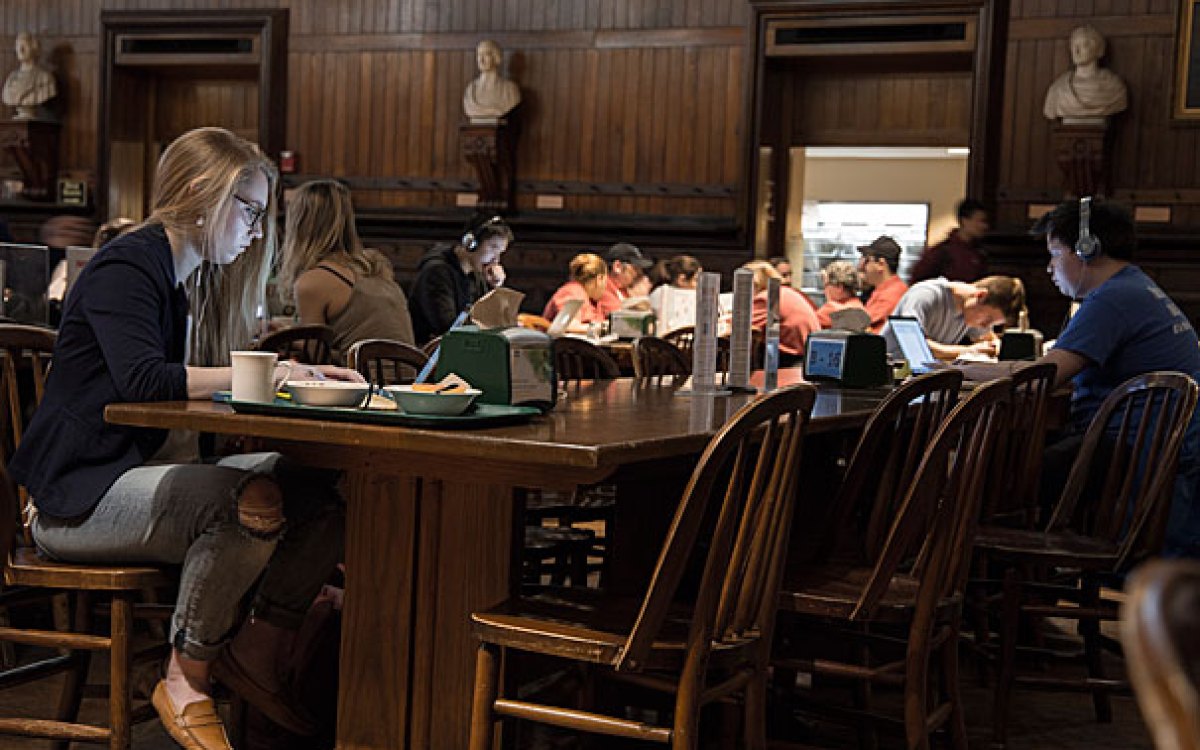
Michelle Gallant, a nutritionist at Harvard University Health Services, aims to take the anxiety out of eating for incoming freshman with the University’s bevy of dietary education programs.
Jon Chase/Harvard Staff Photographer
For freshmen, food for thought
It’s a time of change in eating as well as studying habits, experts say
More like this
As new freshmen spread through Harvard and the surrounding neighborhoods, food options do too, whether in dining halls, restaurants, late-night convenience stores, or departmental receptions. A Harvard dietitian has advice for students fully in charge of their diets for the first time: learn. Don’t worry too much, and remember that food is supposed to be enjoyable.
Michelle Gallant, a nutritionist at Harvard University Health Services (HUHS), said students come to campus from such a wide range of countries, cultures, and culinary backgrounds that the common freshman dietary trend as the fall waxes and wanes may simply be that it’s time to be uncommon, that it’s a time of change.
Food may be more abundant, less familiar, and more diverse than it was at home. Mealtimes may be different. Athletes have to make sure they’re eating right — and enough — to fuel their physical expenditures. There will also be new opportunities for social eating, and, with College students’ famously late bedtimes, there may be moments to squeeze in an extra meal, whether it’s needed or not.
“It’s a tremendous transition time,” Gallant said.
As a result, Gallant said that freshmen sometimes come to HUHS for advice on how to navigate the dining halls, how to fit unfamiliar foods into their diets, what to do about digestive concerns, or stressed over changing habits. In addition to formal office visits, she recommends that students stop by during “dinners with a dietitian” or other informational programs run in the dining halls, and that those with food allergies make sure to talk to their dining managers.
For those without specific health concerns, Gallant said it can be counterproductive to overanalyze diets, to count calories, to eat by focusing on a specific food group — whether to include or exclude it — or to embrace what she called “rule-based” eating. For example, she said, one popular diet restricts carbohydrates, but they are an important energy source for the brain.
“It’s a balance,” Gallant said. “Enjoy food. Avoid skipping meals. Tune in to your body’s own signals of hunger and fullness. We’re trying to avoid rigid thinking about food.”
With a population of high-achieving students, used to striving for academic perfection, too tight a focus on food rules can rob the joy from meals and potentially foster anxiety at the table.
“Eating is one of life’s pleasures,” Gallant said. “Enjoying food means you’re well.”
Harvard abounds with food-related resources, from Harvard University Dining Services’ (HUDS) “Recipes From Home” web form for those who want to share a favorite dish, to The Nutrition Source website at the Harvard T.H. Chan School of Public Health highlighting the latest dietary science, to a certified sports nutritionist available to counsel athletes, to the University’s Science and Cooking lecture series (kicking off Sept. 5), to the “Eaters Digest” newsletter from the Food Literacy Project, to a steady research drumbeat of scientific findings about diet and health.
With all these available resources, Food Literacy Project manager Carolyn Chelius encouraged incoming freshmen to satisfy their curiosity about food and learn, in particular, about nutrition and availability — where and how food is grown — and its social and community aspects. The project itself consists of three areas: a paid student fellowship, a weekly farmer’s market on the Science Center plaza (Tuesdays from noon to 6 p.m.), and events and programs open to the public. The project also partners with the student-run community garden on Mount Auburn Street outside of Lowell House, whose produce is donated to local charities.
Students interested in becoming more involved in such efforts can apply to be food literacy fellows, whose job Chelius said is to “learn more and engage their peer community on topics around the food system.” That mandate translates into organizing educational events and cooking demonstrations in the residence halls, attendance at other food-related events, such as tours of local farms and suppliers, and highlighting food-related issues on campus.
“It’s important to learn as much as possible,” Chelius said.






